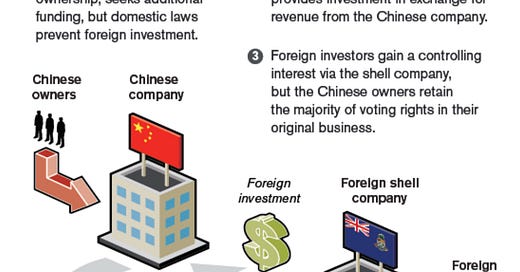Eastern Ascendance
Western conceptions of 'Anti-liberalism' cloud the reality of the economic expansion of China and the East.
Let’s keep it informal today. This post is intended to start a dialogue more than it is designed to be an exhaustive argument.
I believe that one must consider the certainty of economic expansion in the east, especially in China. And these considerations must be made without labeling one as a communist, socialist, or anti-western liberalism.
Look at bay area stationed venture capital firms like Sequoia, who are ramping up their investments in Asia. Look at how China is disrupting capital flows in public markets by seeking to ban VIEs or variable interests entities responsible for $82B of investment through U.S. banks over the last decade. The VIE is a corporate structure that Chinese companies like Alibaba list on the U.S. stock exchanges.
Inside.com, a newsletter on business, tech, and venture capital, founded by angel investor Jason Calacanis, explains the VIE using the illustration below.
So I sit here and consider the implications of tighter Chinese foreign policy on investment as they seek to prevent their domestic businesses from raising capital in U.S. public markets. I ask myself, what might China’s desire to ban VIEs signal?
China feels resolved that it will be able to provide liquidity to its domestic companies without foreign investment.
China sees this as a way to prevent foreign U.S. firms from participating in the value creation of their state-run enterprises.
China uses the New Silk Road and Maritime Silk Road combined with other tactics to establish itself as the new global hegemon.
From an unstructured, non-expert, opinion-based point of view, China is moving up in terms of its capabilities, governance structure, and decision-making. What does this mean for the U.S.? Some of my friends say, throw away the constitution and start over. I’ve heard others say that it will remain divided until the U.S. reckons with matters of equity. Ezra Klein, co-founder of Vox, and author of the book, Why We’re Polarized, says, “The Parties are dividing over fundamental identities that tend to create intolerance and hostility.” I’ve heard people in the defense community say that we need to build a cyber security apparatus into the department of defense to protect ourselves from hostile state and non-state actors influenced by Chinese propaganda.
Still, who is ultimately responsible for the negative view of the United States abroad is elusive. Blame it on Bush? That’s easy. What about Barrack or Trump? And now Biden. Too easy.
I always tie back to my desire to lay the groundwork for an extensive, rigorous critique of American Politics, Government, and liberalism.
Early on, I was focused on making arguments about the limitations of natural law and how the political parties in the U.S. respond to the dynamics the constitution creates. But I was getting lost in the philosophy.
Still, is liberalism living up to the standards of the thinkers who precede its political ideology?
What does serving the people's interests even mean if we cannot accept that there is a system of ideas, of structure, of existence, which is in many ways a stark contrast to liberalism, yet is on a trajectory to outperform?
Let’s take liberty, equity, and justice off the table for a minute - assuming that we even offer that to everyone…
How are we going to compete in the 21st century?
Yang thinks adding a third party will do the trick. But he does not articulate how this third party would change the dynamic in Washington. Yang doesn’t discuss the composition of the house and senate or any version of reorganization that would back up his claims of a third party benefitting Americans. However, he does propose a UBI because he believes we are entering a tech dystopia where robots will supplant the average citizen’s job. So many American citizens will be unable to work because of the INCREDIBLE innovation coming out of Silicon Valley.
Yang’s Forward Party, a political action committee, describes its goals on its website as “the reduction of partisan polarization and implementing electoral reforms.”
Still, is partisanship the reason why the house and senate are oblivious to basic economics, technology, or even reality? I don’t know.
Are we going to change America at the polls? Even the Kremlin knew that you would need to do so before people head to the polls to disrupt an election via Facebook.

And this again… Let me see if I can translate.
“As President, I plan to displace record numbers of American labor because of steep technological advancements that cannot be stopped. In return, I will offer you a ballot with more options.”
I’ve probably strayed away from the topic, but my point is that if you mention the potential shaping up in China, you’re called a communist or a socialist. I’m not either of those. Though, I fully acknowledge some of the weaknesses of western liberalism.
I’m just saying - can we have a more honest discussion about what’s ahead?
More to come….
Holler.




